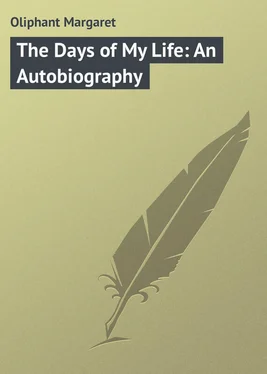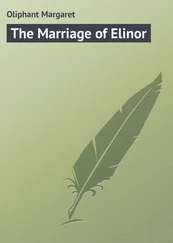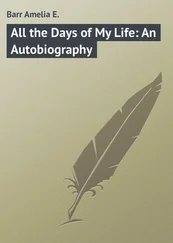Margaret Oliphant - The Days of My Life - An Autobiography
Здесь есть возможность читать онлайн «Margaret Oliphant - The Days of My Life - An Autobiography» — ознакомительный отрывок электронной книги совершенно бесплатно, а после прочтения отрывка купить полную версию. В некоторых случаях можно слушать аудио, скачать через торрент в формате fb2 и присутствует краткое содержание. ISBN: , Жанр: foreign_prose, на английском языке. Описание произведения, (предисловие) а так же отзывы посетителей доступны на портале библиотеки ЛибКат.
- Название:The Days of My Life: An Autobiography
- Автор:
- Жанр:
- Год:неизвестен
- ISBN:http://www.gutenberg.org/ebooks/43404
- Рейтинг книги:5 / 5. Голосов: 1
-
Избранное:Добавить в избранное
- Отзывы:
-
Ваша оценка:
- 100
- 1
- 2
- 3
- 4
- 5
The Days of My Life: An Autobiography: краткое содержание, описание и аннотация
Предлагаем к чтению аннотацию, описание, краткое содержание или предисловие (зависит от того, что написал сам автор книги «The Days of My Life: An Autobiography»). Если вы не нашли необходимую информацию о книге — напишите в комментариях, мы постараемся отыскать её.
The Days of My Life: An Autobiography — читать онлайн ознакомительный отрывок
Ниже представлен текст книги, разбитый по страницам. Система сохранения места последней прочитанной страницы, позволяет с удобством читать онлайн бесплатно книгу «The Days of My Life: An Autobiography», без необходимости каждый раз заново искать на чём Вы остановились. Поставьте закладку, и сможете в любой момент перейти на страницу, на которой закончили чтение.
Интервал:
Закладка:
The boy paused, hesitated; but he had raised his eyes to mine, and he did not withdraw them. His face crimsoned over with a delicate yet deep flush, like a girl’s – then he grew pale – and then he said slowly —
“I cannot tell a lie – my father’s name was Brian Southcote, I am Edgar; I will not deny my name.”
I cried out triumphantly, “Now, papa!” but my father made an impatient gesture commanding me away; it was so distinctly a command now, that I was awed and dared not disobey him. I turned away very slowly through the thick evergreens, looking back and lingering as I went. I was just about to turn round by the great Portugal laurel, which would have hid from me these three figures standing together among the elm trees and against the sky, when my father called me to him again. I returned towards him gladly, for I had been very reluctant to go away.
“Hester, these gentlemen will accompany you,” he said, with a contemptuous emphasis, “show them to my library, and I will come to you.”
I cannot tell to what a pitch my anxiety and excitement had risen – it was so high, at least, that without question or remark, only very quickly and silently, I conducted my companions to the house, and introduced them to my father’s favorite room, the library. It was a very long, large room, rather gloomy in the greater part of it, but with one recessed and windowed corner as bright as day. My life had known no studies and few pleasures, that were not associated with this un-bright corner, with its cushioned window-seat and beautiful oriel. When we entered, it was almost twilight by my father’s writing-table, behind which was the great window with the fragrant walnut foliage overshadowing it like a miniature forest – but a clear, pale light, the evening blessing – light, as sweet and calm as heaven itself, shone in upon my little vase of faint, sweet roses – roses gathered from a tree that blossomed all the year through, but all the year through was sad and faint, and never came to the flush of June. Edgar Southcote sank wearily into a chair almost by the door of the library, but Saville, whom I almost began to hate, bustled about at once from one window to another, looking at everything.
“Fine old room – I’d make two of it,” said this fellow; “have down a modern architect, my boy, and make the place something like. Eh, Edgar! what, tired? you had better pluck up a spirit, or how am I to manage this worthy, disinterested uncle of yours?”
I could not let the man think I had heard him, but left the room to seek my father – what could he mean? I met my father at the door, and with a slight wave of his hand bidding me follow him, he went on before me to the dining parlor, the only other room we used; my excitement had deepened into painful anxiety – something was wrong – it was a new thought and a new emotion to me.
“What is the matter, papa?” I said, anxiously, “what is wrong? what has happened? do you think this is not my cousin, or are you angry that he has come? Father, you loved my uncle Brian, do you not love his son?”
“Hester!” said my father, turning away his troubled face from my gaze and the light, “I will not believe that this boy is my brother Brian’s son.”
“But he says he is, papa,” I answered, with eagerness; I did not believe in lying, and Edgar Southcote’s pale face was beyond the possibility of untruth.
“It is worth his while to say it,” my father exclaimed hurriedly; then a strange spasm of agitation crossed his face – he turned to me again as if with an irrestrainable impulse to confide his trouble to me. “Hester! Brian was my elder brother,” he said in a low, quick whisper, and almost stealthily. I did not comprehend him. I was only a child – the real cause of his distress never occurred to me.
“I know it would be very hard to take him home to Cottiswoode for a Southcote, and then to find out he was not uncle Brian’s son,” I said, looking up anxiously at my father, “and you know better than I, and remember my uncle; but papa — I believe him – see! I knew it – he is like that picture there!”
My father turned to the picture with a start of terror; it was an Edgar Southcote I was pointing to – a philosopher; one of the few of our house, who loved wisdom better than houses or lands, one who had died early after a sad short life. My father’s face burned as he looked at the picture; the refined visionary head drooping over a book, and the large delicate eyelids with their long lashes were so like, so very like! – it struck him in a moment. “Papa, I believe him,” I repeated very earnestly. My father started from me, and paced about the room in angry agitation.
“I have trained you to be mistress of Cottiswoode, Hester,” he said, when he returned to me. “I have taught you from your cradle to esteem above all things your name and your race – and now, and now, child, do you not understand me? if this boy is Brian’s son, Cottiswoode is his! ”
It was like a flash of sudden lightning in the dark, revealing for an instant everything around, so terribly clear and visible – I could not speak at first. I felt as if the withering light had struck me, and I shivered and put forth all my strength to stand erect and still; then I felt my face burn as if my veins were bursting. “This was what he meant!”
“What, who meant? Who?” cried my father.
“You believe he is Edgar Southcote, papa?” said I, “you believe him as I do; I see it in your face – and the man sneers at you — you , father! because it is your interest to deny the boy. Let us go away, and leave him Cottiswoode if it is his; you would not do him wrong, you would not deny him his right – father, father, come away!”
And I saw him, a man whose calm was never broken by the usual excitements of life, a man so haughty and reserved that he never showed his emotions even to me – I saw him dash his clenched hand into the air with a fury and agony terrible to see. I could not move nor speak, I only stood and gazed at him, following his rapid movements as he went and came in his passion of excitement, pacing about the room; the every day good order and arrangement of every thing around us; the calm light of evening, which began to darken; the quiet house where there was no sound of disturbance, but only the softened hum of tranquil life – the trees rustling without, the grass growing, and night coming softly down out of the skies; nothing sympathized with his fiery passion, except his daughter who stood gazing at him, half a woman, half a child – and nothing at all in all the world sympathized with me.
Very gradually he calmed, and the paroxysm was over; then my father came to me, and put his hands on my shoulders, and looked into my strained eyes; I could not bear his gaze, though I had been gazing at him so long, and thick and heavy, my tears began to fall; then he stooped over me and kissed my brow. “My disinherited child!” that was all he said – and he left me and went away.
Then I sat down on the carpet by the low window, and cried – cried “as if my heart were breaking,” but hearts do not break that get relief in such a flood of child’s tears. I felt something in my hand as I put it up to my wet eyes. It was the bit of briony which I had carried unwittingly a long, long way, through all my first shock of trouble. Yes! there were the beautiful tinted berries in their clusters uninjured even by my hand – but the stem was crushed and broken, and could support them no longer; the sight of it roused me out of my vague but bitter distress – I spread it out upon my hand listlessly, and thought of the low hedge from which I had pulled it, a bank of flowers the whole summer through. It was our own land — our own land – was it ours no longer now?
Читать дальшеИнтервал:
Закладка:
Похожие книги на «The Days of My Life: An Autobiography»
Представляем Вашему вниманию похожие книги на «The Days of My Life: An Autobiography» списком для выбора. Мы отобрали схожую по названию и смыслу литературу в надежде предоставить читателям больше вариантов отыскать новые, интересные, ещё непрочитанные произведения.
Обсуждение, отзывы о книге «The Days of My Life: An Autobiography» и просто собственные мнения читателей. Оставьте ваши комментарии, напишите, что Вы думаете о произведении, его смысле или главных героях. Укажите что конкретно понравилось, а что нет, и почему Вы так считаете.












